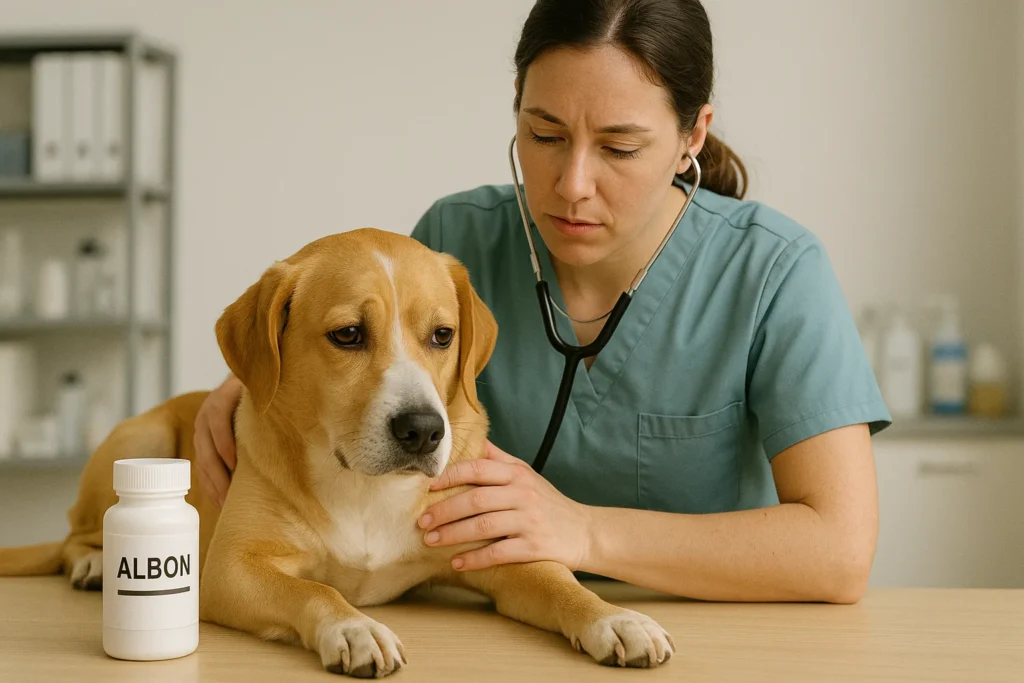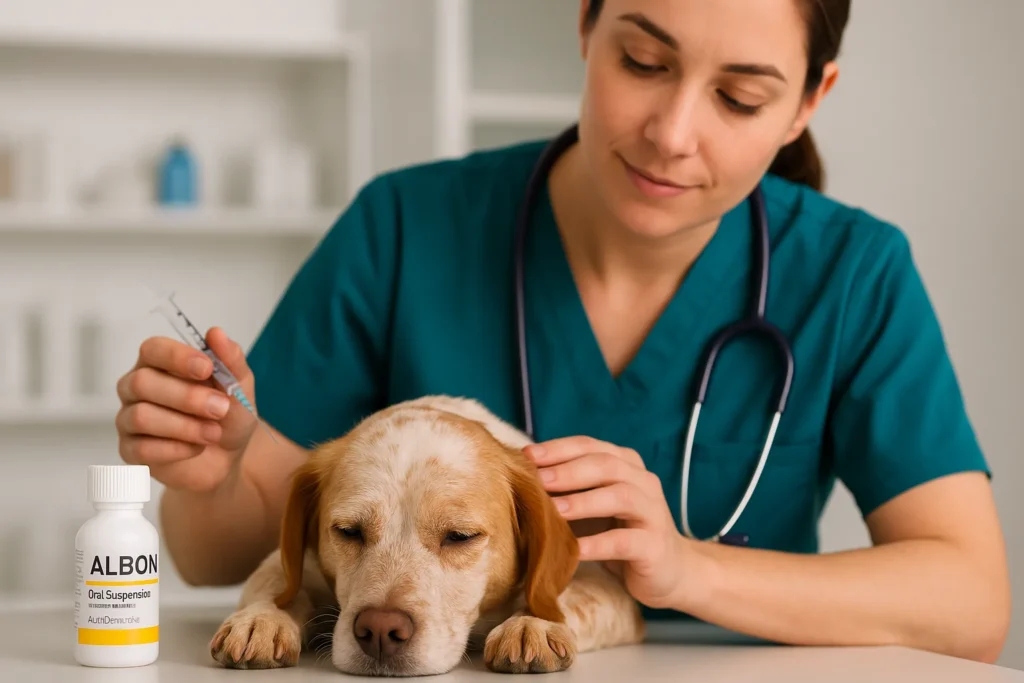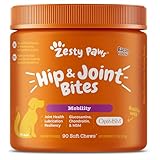What is the correct Albon dosage for dogs? Albon (sulfadimethoxine) is a common antibiotic prescribed to treat bacterial and parasitic infections in dogs, including coccidiosis. The standard dosage is 25 mg per pound of body weight on the first day, followed by 12.5 mg per pound daily until symptoms resolve.
Always consult your vet before administering Albon, as incorrect dosing can lead to side effects like vomiting, diarrhea, or kidney issues.
Overview
| FDA-Approved | Yes |
| Active Ingredient | Sulfadimethoxine (a sulfonamide antibiotic) |
| Available Forms | Oral Suspension (5%): Custard-flavored liquid (250 mg/5 mL) 25. Tablets: 125 mg, 250 mg, 500 mg (scored for splitting) 36. Injectable (40%): Administered by vets for rapid absorption 28. |
| Storage | Store at 59°–86°F (15°–30°C); no refrigeration needed 25. |
| Prescription Required | Yes (federally restricted to veterinary use). |
Key Takeaways
- Standard Dosage: 25 mg/lb (Day 1), then 12.5 mg/lb daily.
- Common Uses: Treats coccidiosis, bacterial infections.
- Side Effects: Vomiting, diarrhea, loss of appetite.
- Safety Tips: Always follow vet instructions; avoid in pregnant dogs.
- Alternatives: Ponazuril, toltrazuril for resistant coccidia.
What Is Albon (Sulfadimethoxine)?
Albon® is an FDA-approved sulfa-class antibiotic used to treat infections caused by coccidia (Isospora spp.) and certain bacteria. It works by inhibiting folic acid synthesis in parasites, stopping their growth.
Albon Dosage For Dogs
- Initial Administration: Administer 25 mg per pound (equivalent to 55 mg/kg) of the animal’s body weight.
- Maintenance Dose: Follow up daily with 12.5 mg per pound (or 27.5 mg/kg) of the animal’s body weight.
To simplify dosing across different animal sizes, the medication is available in three tablet strengths. The chart below provides guidance on selecting the right dose based on the animal’s weight and tablet strength. Continue follow-up doses every 24 hours.
Albon Dosage Chart for Dogs by Weight
| Tablet Size | Approximate Animal Weight | Initial Dose 25 mg/lb (55 mg/kg) | Subsequent Daily Doses 12.5 mg/lb (27.5 mg/kg) |
|---|---|---|---|
| 125 mg | 5 lb (2.2 kg) | 1 tablet | 1/2 tablet |
| 250 mg | 10 lb (4.5 kg) | 1 tablet | 1/2 tablet |
| 500 mg | 20 lb (9.1 kg) | 1 tablet | 1/2 tablet |
Conditions Treated with Albon
- Coccidiosis (intestinal parasite caused by Isospora spp.)
- Respiratory infections (including kennel cough complications)
- Urinary tract infections (UTIs)
- Soft tissue infections (wounds, abscesses, etc.)
Albon Side Effects in Dogs
When it comes to medications, even those prescribed by a vet, it’s always smart to know what you’re dealing with. Albon (sulfadimethoxine) is generally safe when used as directed, but like any drug, it can come with its share of side effects—especially if your dog is sensitive or if the dosage is off.
Some of the most commonly reported side effects of Albon® in dogs include:
These side effects are typically mild, but if they persist or worsen, it’s best to contact your veterinarian. Overdosing or prolonged use can sometimes lead to more serious health concerns, which is why close monitoring and proper dosing are crucial.
These symptoms are usually mild and temporary. Often, they appear when the treatment begins and fade as the dog’s system gets used to the medication. If the symptoms persist beyond a few days, it’s a good idea to consult your vet.
It’s also important to note that some dogs might show signs of gastrointestinal discomfort. If your pup has a sensitive stomach, it might be more prone to issues like vomiting or loose stools. Giving Albon with food can sometimes help reduce stomach upset.
In rare cases, dogs may develop a low-grade fever or slight skin rash. These are signs of mild allergic reactions and should be monitored closely.
If you’re ever unsure whether a symptom is related to Albon, don’t hesitate to call your vet. It’s always better to double-check than to assume everything is okay.
Serious Reactions to Watch For
While Albon is generally safe, there are some red flags that should never be ignored. Serious adverse reactions are rare, but when they do occur, they can be dangerous if not treated promptly.
Here are some serious side effects to be aware of:
- Facial swelling (especially eyes/muzzle) – May indicate anaphylaxis
- Severe itching/hives – Classic allergic reaction symptom
- Sudden behavioral changes (aggression, confusion) – Possible neurological impact
- Jaundice (yellow gums/eyes) – Sign of liver damage
- Uncoordinated movement/tremors – Potential neurotoxicity
- Seizures – Medical emergency
These signs may indicate an allergic reaction, liver issues, or even neurological effects. If any of these symptoms appear, stop administering the drug immediately and seek emergency veterinary care.
One rare but dangerous condition associated with sulfonamides like Albon is Keratoconjunctivitis sicca (also known as dry eye), where the tear glands stop producing adequate tears. If your dog begins excessively pawing at its eyes or if their eyes look dry and red, it’s a warning sign.
Remember, the earlier you spot these reactions, the better the outcome for your furry friend.
What to Do in Case of Albon® Overdose
An overdose of Albon can escalate quickly from mild symptoms to something potentially life-threatening. If you suspect that your dog has consumed too much whether accidentally or due to incorrect dosing it’s essential to act fast.
Symptoms of an Albon overdose can include:
- Vomiting and severe diarrhea
- Depression or extreme lethargy
- Lack of coordination
- Blood in stool or urine
- Seizures or tremors
First, don’t panic. Time is of the essence, so contact your veterinarian or an emergency animal poison control center immediately. The ASPCA Animal Poison Control Center (888-426-4435) is available 24/7.
While waiting for help, make sure your dog has access to fresh water. Do not try to induce vomiting unless directed to by a vet.
Veterinarians may administer IV fluids to flush out the drug, provide activated charcoal to limit further absorption, or even hospitalize the dog for observation and support.
To avoid this scenario altogether, always use the measuring tool provided with the prescription, and double-check the label for the correct dosage every time.

Medications That May Interact With Albon
Just like people, dogs can be on more than one medication at a timeand that’s where things can get tricky. Albon, while effective on its own, can interact with other drugs in ways that may reduce its effectiveness or increase the risk of side effects.
Some of the most common medications that may interact with Albon include:
- Warfarin or other blood thinners – Albon can enhance the effects, raising the risk of bleeding.
- Methotrexate – Used for cancer or autoimmune diseases, this can become more toxic when combined with sulfonamides.
- Phenytoin – An anti-seizure medication that may have its levels altered when given with Albon.
- Diuretics – These can intensify dehydration risks when used with Albon, especially in older dogs.
- Other sulfa drugs – Combining them increases the chances of allergic reactions or toxicity.
To stay on the safe side, always tell your vet about any medications, supplements, or even over-the-counter products your dog is taking. Even natural remedies can sometimes have unexpected effects when mixed with prescription drugs.
Also, if your dog is on long-term medication for a chronic condition, you might want to ask your vet to review how Albon fits into the treatment plan.
Dogs Who Should Avoid Albon
While Albon is a go-to antibiotic for many vets, it’s not suitable for every pup. Some dogs have underlying conditions or specific sensitivities that make this drug a bad match.
Dogs who should avoid Albon include:
- Pregnant or lactating dogs – Albon can cross the placenta and is not recommended during pregnancy unless absolutely necessary.
- Dogs with liver or kidney disease – Since these organs metabolize and excrete the drug, compromised function could lead to toxicity.
- Dogs with a history of sulfa drug allergies – If your dog has ever had a reaction to a sulfonamide antibiotic, Albon should be off-limits.
- Very young puppies – Though often prescribed for young dogs with coccidia, extremely young or weak puppies might need an adjusted dose or an alternative treatment.
Also, if your dog has shown hypersensitivity reactions in the past—such as swelling, hives, or respiratory distress—be sure to bring that up before starting any new meds, including Albon.
Your vet may perform a thorough physical exam, and possibly blood tests, before prescribing Albon, just to ensure your dog’s system can handle it.
Alternatives to Albon
In some cases, Albon may not be the best choice. Whether due to side effects, allergies, or lack of effectiveness, there are several alternative medications that vets might consider.
Some common alternatives include:
- Metronidazole – Often used for giardia and anaerobic infections.
- Ponazuril (Marquis) – An effective treatment for coccidiosis with fewer reported side effects.
- Clindamycin – Useful for certain bacterial infections, especially dental-related or soft tissue.
- Tylosin – Sometimes used for chronic diarrhea or gastrointestinal infections.
Each of these medications comes with its own risks and benefits, so your vet will decide which one is best based on your dog’s health history and the specific infection being treated.
It’s also worth noting that natural remedies and probiotic therapies are gaining popularity for supporting gut health during or after antibiotic use. These don’t replace prescription medications for infections but can be a helpful part of a well-rounded treatment plan.
Albon Use in Puppies vs. Adult Dogs
When it comes to Albon, age definitely matters. Puppies and adult dogs can both take the drug, but the approach to treatment might differ slightly based on their developmental stage, size, and immune strength.
Puppies are most often prescribed Albon for coccidiosis. Because their immune systems are still developing, they’re especially vulnerable to intestinal parasites. In these cases:
- Doses are calculated carefully by weight
- Liquid suspensions are usually preferred for ease
- Additional hydration support may be needed if diarrhea is severe
Young pups may also be treated preventatively in shelter environments to curb outbreaks. It’s important that any medication is dosed correctly to avoid complications in still-developing organs.
For adult dogs, Albon may be used for a wider range of bacterial infections. Their stronger immune systems usually mean quicker recovery times, but the vet might still recommend probiotics to maintain gut health during treatment.
One big concern for both puppies and adult dogs is dehydration, especially if the infection causes vomiting or diarrhea. Always ensure your dog has access to clean water and isn’t showing signs of dehydration (sunken eyes, dry gums, poor skin elasticity).
The key difference is that puppies need more monitoring due to their size, development, and weaker immunity. Adults usually handle the medication better but can still experience side effects if not dosed correctly.
References:
- Elanco US Inc. (Current Label). Albon® (Sulfadimethoxine) Tablets – 125 mg, 250 mg, 500 mg – Veterinary Use Only. FDA-approved labeling. Available at: https://www.elanco.com
- Plumb, D.C. (2021). Plumb’s Veterinary Drug Handbook (9th ed.). Wiley-Blackwell.
— Referenced for standard dosing guidelines of sulfadimethoxine in small animals. - FDA Center for Veterinary Medicine. (n.d.). Drug Approval Package: Albon (NADA 012-491). U.S. Food & Drug Administration. Retrieved from: https://animaldrugsatfda.fda.gov
- Papich, M.G. (2016). Saunders Handbook of Veterinary Drugs: Small and Large Animal (4th ed.). Elsevier Health Sciences.
— Used for confirmation of dosage recommendations and treatment durations.
FAQs
How long does it take for Albon to work in dogs?
Most dogs show improvement within 2–3 days, but complete treatment (usually 5–20 days) is crucial to prevent relapse.
Can Albon be given with food?
Yes! Giving Albon with a small meal reduces stomach upset.
What if I miss a dose?
Give the dose as soon as you remember. If it’s near the next dose, skip the missed one—never double-dose.
Is Albon safe for puppies?
Yes, but only under veterinary supervision. Puppies are more prone to dehydration from diarrhea.
Final Thoughts
Albon is a trusted treatment for coccidia and bacterial infections in dogs, but correct dosing is critical. Always follow your vet’s instructions and monitor for side effects. If your dog isn’t improving, ask about alternatives like ponazuril.











![Can Dogs Eat Blood? 7 Side Effects [Expert Opinion]](https://petskor.com/wp-content/uploads/2022/04/Webp.net-resizeimage-12.jpg)
